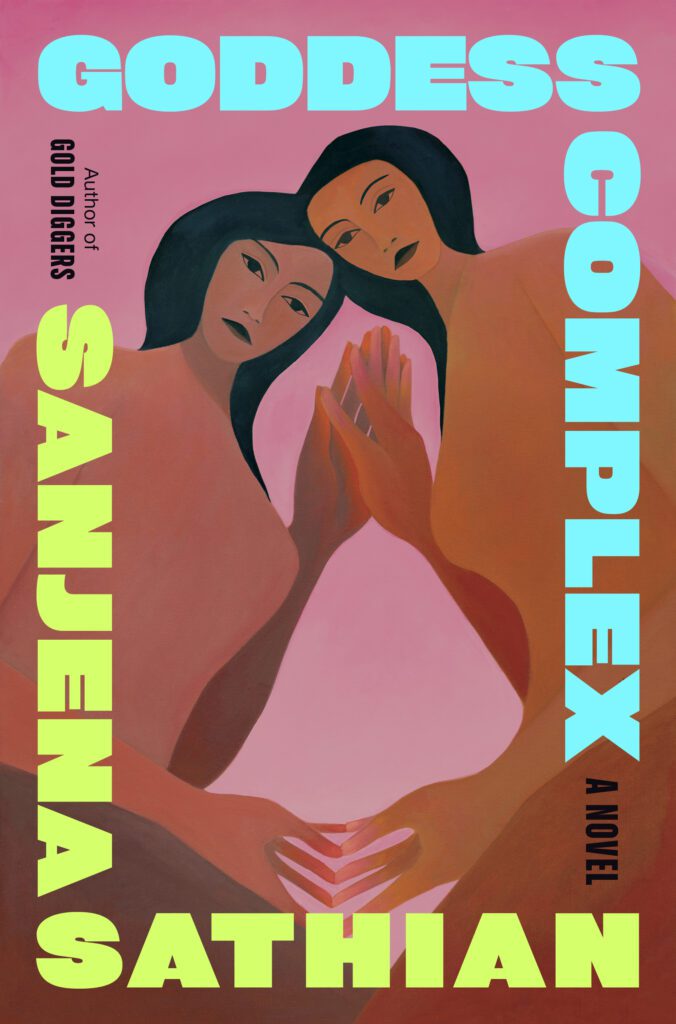
Reviewers : Tanya Samal & Athmaja Biju
Title: Goddess Complex
Author: Sanjena Sathian
Genre: Fiction/Novel
Language: English
Year: 2025
Publisher: HarperCollins Publishers India
Pages: 237
Price: INR 599/-
P-ISBN: 978-93-6569-053-9
Sanjena Sathian’s second novel “Goddess Complex” playfully yet with so much conviction, dissects the millennial woman’s relationship with motherhood, identity, and choice. Following her acclaimed debut “Gold Diggers,” Sathian offers a psychological thriller that doubles as a razor-sharp feminist satire, creating a narrative that feels urgently contemporary and simultaneously ancient in its concerns.
At thirty-two, Sanjana Satyananda is a PhD candidate in Anthropology on medical leave, separated from her unsuccessful actor husband Killian after rejecting his sudden desire for children at a remote commune in India. While her sister and best friend seemingly navigate the expectations and nuances of modern womanhood with ease, Sanjana is left to pick up the pieces of her traumatized, troubled self.
The novel’s conflict starts when Sanjana begins receiving congratulatory messages about a pregnancy that doesn’t exist. Her quest to track down her missing husband leads her to a fertility retreat in Pune, India, where she encounters her uncanny doppelgänger, Sanjena Sathian, a “pregnancy influencer” who has seemingly appropriated both her identity and her husband. What follows is a mind-bending exploration of selfhood and female experience of fertility.
The novel begins with remarkable promise. Sathian’s prose is sharp, confident and immersive. It pushes the boundaries of literary fiction into a compelling and psychologically alert narrative, particularly in the early chapters where Sanjana’s irresoluteness towards motherhood is accomplished with both vulnerability and asperity. The unravelling of her life marked by her fractured marriage with Killian, her unease with normative adulthood and the ominous ambiance of the story is established well. There is a dark allure in the progression of the plot and Sathian successfully manages to incorporate pivotal social commentaries around the commodification of reproduction and wellness culture.
Sathian’s greatest achievement lies in her portrayal of consciousness under siege. As Sanjana recovers from a concussion at the retreat, the boundaries between reality and delusion dissolve. The author captures the disconcerting sensation of watching oneself be remade from within.The prose achieves a hypnotic quality that immerses readers in Sanjana’s dissociative state.
Despite its psychological intensity, “Goddess Complex” maintains a biting satirical edge. Sathian satirises contemporary wellness culture and fertility entrepreneurship. The commodification of even our most intimate biological processes becomes a target for the author’s incisive wit.
The novel’s exploration of South Asian American identity, while less explicit than in “Gold Diggers,” adds crucial depth to its examination of reproductive expectations. The particular pressures placed on South Asian women regarding marriage and motherhood create an additional layer of cultural critique that feels authentic and necessary.
The novel addresses the peculiar terror of confronting alternate versions of oneself—the lives not lived, the choices not made, the selves we might have become.
The novel’s treatment of abortion, fertility anxiety, and the commodification of reproductive technology feels both timely and necessary. Rather than offering easy answers, Sathian presents the complexity of these issues with intelligence and empathy, creating space for readers to examine their own assumptions and choices.
The book excels in its foreboding atmosphere and its willingness to experiment with form throughout the plot. The retreat in Pune, introduced with a gothic and macabre atmosphere, becomes the center for strange rituals and the arrival of new characters. It also provides the scope to pose the important questions of the book: What does autonomy look like when biology, culture, and capitalism collide? How do women navigate their desires when societal scripts are so prescriptive?
However, as the plot progresses, the nuance gives way for archetypes. The new characters feel like caricatures with personalities that seem to be governed by their functions and not their complexities. Towards the second half of the novel, the story feels quite claustrophobic and anxiously completed. This may be a deliberate stylistic choice that mirrors Sanjana’s psychological fragmentation, but the effect distances the reader.
One of the novel’s most striking features is its examination of womanhood through multiple lenses. Sathian ensures that the story passes the Bechdel test with ease, and the contrasting views on motherhood across the women in the novel are refreshing in their diversity. However, Sanjana’s own stance on motherhood and its origins, its intensity, and its volatility is never presented. She resists it, even mocks it, but the book doesn’t provide enough of the emotional scaffolding that might explain why. Her relationship with her mother also feels like a missed opportunity for exploration as it was one of the most impactful chapters of the entire book. The novel hints at intergenerational distance and cultural expectation, but never lingers long enough to excavate them with the care they deserve.
The plot too sidelines its own thriller establishment. The core premise of Killian’s disappearance, initially presented as a mystery to be solved, fizzles out gradually, engulfed by the retreat’s subplot. The ending, though seems fitting, feels rather abrupt. It leaves the crucial notions unresolved, particularly those around fatherhood and male agency, which aren’t developed enough for a novel that is based on the ideas of reproductive autonomy.
Despite these limitations, Goddess Complex remains ambitious and thematically bold. Its attempt to render the fragmentation of the self under the weight of societal expectations is commendable. Sathian’s voice is resolute, and the book works vividly in its presentation. But in striving to say so much, it sometimes leaves its most urgent questions only half-asked.
Subscribe to our newsletter To Recieve Updates
Join our newsletter to receive updates